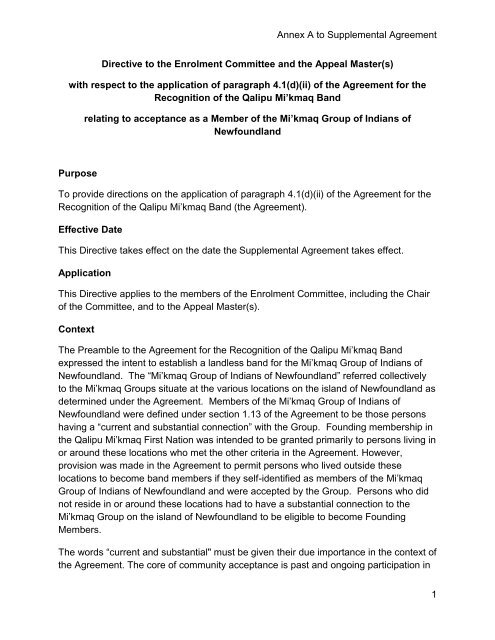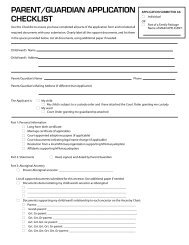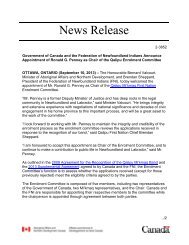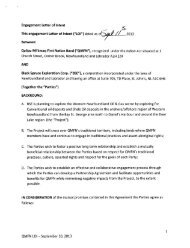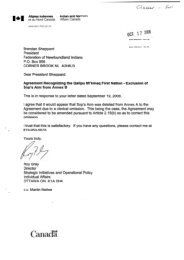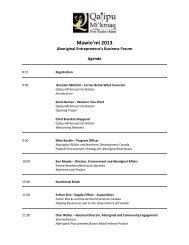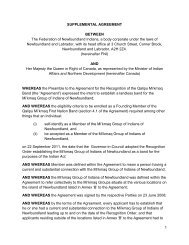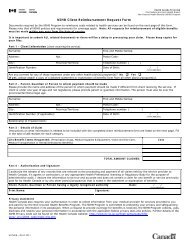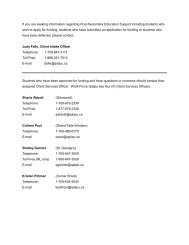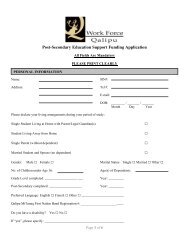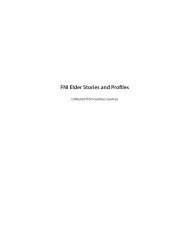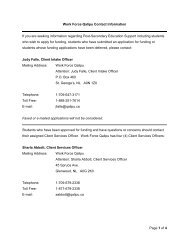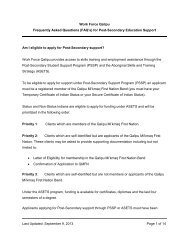Directive - Qalipu Mi'kmaq - First Nation Band
Directive - Qalipu Mi'kmaq - First Nation Band
Directive - Qalipu Mi'kmaq - First Nation Band
Create successful ePaper yourself
Turn your PDF publications into a flip-book with our unique Google optimized e-Paper software.
Annex A to Supplemental Agreementdescribe in detail the nature and purpose of the visits or communications, and thereligious, ceremonial, traditional or cultural activities practiced by the applicant inone of the locations of the Mi’kmaq Group of Indians of Newfoundland, to permita reasonable inference that the Mi’kmaq Group of Indians in one of the locationswould view the person as a Member of the Group. Affiants must identifythemselves as residents of the Mi’kmaq Group of Indians of Newfoundland onthe island of Newfoundland (from one of the locations of the Mi’kmaq Group ofIndians of Newfoundland), and state their relationship to the applicant. Theyshould have personal and specific knowledge of the information contained intheir affidavits. Affidavits must provide sufficient detail factual information. Merestatements in an affidavit that an applicant recycles, composts, hunts, fishes orberry picks are not sufficient to establish that the applicant has knowledge ofMi’kmaq customs, traditions or beliefs or pursues traditional activities of theNewfoundland Mi’kmaq. The affidavits must include details on the manner andfrequency of the exercise of these activities in one of the locations of the Mi’kmaqGroup of Indians of Newfoundland.12. Moreover, applicants providing new evidence must submit a sworn declarationattesting to the authenticity of the evidence provided and how it relates to theirparticipation in or integration into the ceremonial, traditional, or cultural activitiesof the Mi’kmaq Group of Indians of Newfoundland.Paragraph 25(b)(i) – Non residents’ frequent visits and communications13. In order to be considered frequent, for the purposes of paragraph 25(b)(i) visitsand communications should occur on a regular basis over an extended period oftime prior to or contemporaneous to the signing of the Agreement (23 June2008).14. Visits and communications must not be limited to family members; the evidencemust demonstrate contacts with other Members of the Mi’kmaq Group of Indiansof Newfoundland and involvement in the cultural and social life of the Mi’kmaqcommunity in one of the locations of the Mi’kmaq Group of Indians ofNewfoundland.15. Examples of documentary evidence pre-dating or contemporaneous to thesigning of the Agreement (23 June 2008) which may be submitted to establishthat the applicant meets the requirements of paragraph 25(b)(i) includes: air plane tickets; travel itineraries issued by a major carrier or recognized travel agency;5
Annex A to Supplemental Agreementcredit card bills;phone bills;original dated letters, e-mails or other written communications;Paragraph 25(b)(ii) - Non residents’ maintenance of the Mi’kmaq cultureand way of life16. Maintenance of the Mi’kmaq culture and way of life can be inferred frommembership in the Federation of Newfoundland Indians, Ktaqamkuk Mi’kmaqAlliance, Benoit <strong>First</strong> <strong>Nation</strong>, Kitpu band or Sip’kop Mi’kmaq band prior to 23June 2008.17. Maintenance of the Mi’kmaq culture or way of life can be inferred from evidencethat pre-dates or is contemporaneous to the signing of the 23 June 2008Agreement for the Recognition of the <strong>Qalipu</strong> <strong>Band</strong>, supported by the affidavitsand the sworn declaration referenced in sections 11 and 12, showing that theapplicant has attended, participated in or supported religious, ceremonial,traditional or cultural, activities of the Mi’kmaq Group of Indians of Newfoundlandor has demonstrated initiatives taken to gain knowledge of the Mi’kmaq way oflife and to interact with the Mi’kmaq Group of Indians of Newfoundland.18. Examples of religious, ceremonial, traditional and cultural activities of theMi’kmaq Group of Indians of Newfoundland include:Religious/Ceremonial/CulturalMi’kmaq language trainingSt. Anne’s Day celebrationsFlat Bay Pow Wow or other Pow WowsSt. George’s Mi’kmaq DancersThe Sipu'ji'j Drummers and Se't A'newey Kina'matino'kuom Choir<strong>Nation</strong>al Aboriginal DaySweat lodge, sunrise ceremonyElders FeastTraditional ActivitiesProduction of Mi’kmaq craftsTrapping, hunting or fishing in areas where historical texts identified theapplicant’s direct ancestor(s) having been engaged in such activitiesGathering berries as a food supplement for Members of the Mi’kmaq Group ofIndians of Newfoundland6
Annex A to Supplemental AgreementProvincial trapping, hunting or fishing permit or license for an area that historicaldocuments show was used by the applicant’s ancestors for these purposesDeed, Notice of Assessment for municipal tax purposes, affidavit from aMunicipal Official or utility bill showing address in a location of the Mi’kmaqGroup of Indians of Newfoundland.20. An Applicant under the age of 18 years as of the date of the application made onhis or her behalf shall be considered to have maintained the Mi’kmaq culture andway of life if at least one of his or her parents has been determined by theEnrolment Committee to conform with the requirements of paragraph 25(b)(ii).An Applicant under the age of 18 years on the date of the Recognition Order butwho has made an application after attaining the age of 18 years shall beconsidered to have maintained the <strong>Mi'kmaq</strong> culture and way of life if at least oneof his or her parents has been determined by the Enrolment Committee toconform with the requirements of paragraph 25(b)(ii).For the application of this section, where a parent is deceased, the EnrolmentCommittee shall determine, based on documentation presented in support of theapplication, whether the parent would have conformed with the requirements ofparagraph 25(b)(ii) if that parent had applied.8
Annex A to Supplemental AgreementPoint System for the assessment of the substantial connection of applicants whowere not residing in a location of the Mi’kmaq Group of Indians of Newfoundlandon the date of the Recognition Order(Subsection 25(b) of Enrolment Committee Guidelines)A minimum of 13 points is required. Primary regard will be given to the five year periodimmediately preceding the date of application. However, evidence relating to facts post-datingthe date of the Recognition Order is not relevant and must not be considered.Frequent visits to members of a location ofthe Mi’kmaq Group of Indians ofNewfoundland.(See sections 13 to 15.)Up to 4 points depending on strength of evidenceand the frequency of the visits.Frequent communications with members oflocation of the Mi’kmaq Group of Indians ofNewfoundland.(See sections 13 to 15.)Up to 2 points depending on strength of evidenceand the frequency of the communications.Note: At least 1 point must be earned under visits and/or communications.Residency on the Island of Newfoundland.(See sections 2 to 4.)3 points.Note: Only Ordinary residence is accepted; an applicant may have only one place of ordinary residence.Membership in a Mi’kmaq organization:FNI, KMA, Benoit <strong>First</strong> <strong>Nation</strong>, Kitpu <strong>Band</strong>,Sip’kop Mi’kmaq <strong>Band</strong>.(See section 16.)9 points.Maintenance of Mi’kmaq culture and wayof life through knowledge of Mi’kmaqculture and participation in cultural,religious, ceremonial and traditionalactivities of the Mi’kmaq Group of Indiansof Newfoundland.(See sections 17 to 19.)Up to 9 points, depending on the strength of theevidence (relevancy and probative value).The greater number of activities and the natureand degree of involvement will be considerationsin awarding a higher number of points. Factors toconsider include: frequency of the participation,long established history of participation, level ofinvolvement (i.e. was the applicant an organizer,participant or spectator), relation of the activity tothe advancement of the culture of the Mi’kmaqGroup of Indians of Newfoundland.9


